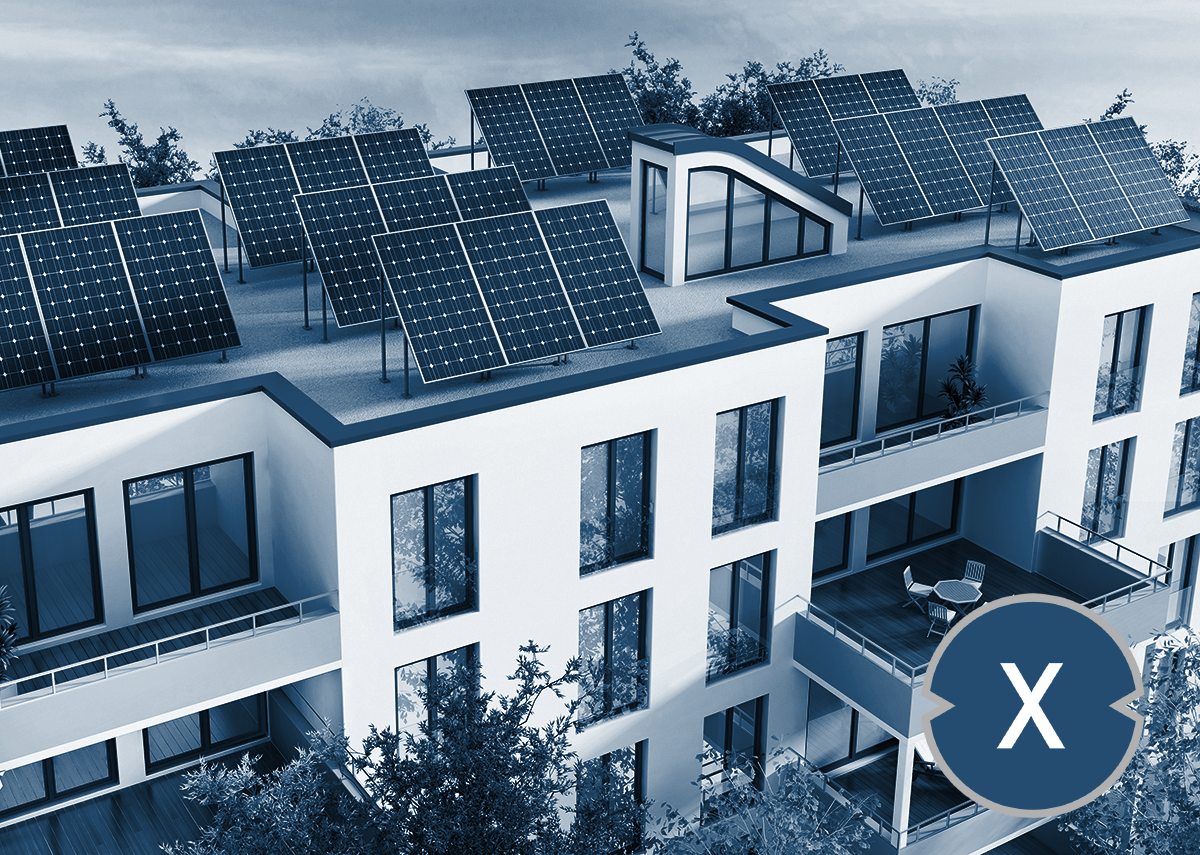Photovoltaics requirement for buildings is an important building block for independence and climate neutrality
The energy transition announced by the federal government and the reduction in dependence on Russian gas triggered by the war in Ukraine have led to an even greater focus on renewable energies. In addition to wind power, it is primarily photovoltaics that will cover energy needs in the future. To ensure this, the government in Berlin and the EU Commission are also planning measures such as the introduction of a solar requirement for buildings. It is intended to help achieve the EU target for the contribution of renewable energies, which has been increased from 40 to 45%. Manufacturers and suppliers of PV systems can therefore expect a significant increase in demand.
According to EU President Ursula von der Leyen, the photovoltaic requirement for buildings should be an important building block in creating the ambitious path to climate neutrality. The plan is to oblige companies and the public sector as well as private homeowners to generate electricity from solar energy on their roofs in the future.
While according to current plans, the photovoltaic requirement for residential buildings is to be implemented by 2029, stricter rules apply to public and commercial buildings: the obligation to install PV systems should be implemented by 2025.
The goal: changeover by the end of the decade
The project is expected to succeed with the help of the EU plan “REPower”, which von der Leyen recently publicly presented. In it she stated the goal of “becoming independent of Russian fossil fuels as quickly as possible”. The obligation to install PV systems on roofs by 2025 or 2029 is ambitious but quite realistic, said the EU President. The project is to be supported by improved administrative processes. In the future, approvals should be made more quickly by EU members creating appropriate central contact points in their authorities.
The optimized decision-making processes should mean that approval periods of less than one year are possible, instead of applicants having to wait an average of six to nine years for official approval, as was often the case up to now. But the EU Commission wants even more. Decisions about the construction of PV roof systems in certain areas should be made within a few months. At the same time, such a short period should generally apply to smaller PV systems with an output of less than 150 kilowatts.
If the strategy is successfully implemented, the EU Commission expects a massive increase in energy generation using solar technology. By the end of the decade, a DC output of 640 gigawatts should be achieved in the EU using photovoltaics. European PV manufacturers assess the situation somewhat more cautiously. But they also predict that a DC output of at least 672 gigawatts will be possible by 2030. This shows what immense potential there is in PV technology that has not yet been tapped.
Solar obligation in parking lots?
A possible solar obligation does not only apply to new or renovated house roofs. In addition, the German authorities want to exploit a potential that has so far been largely untapped: public parking spaces. They occupy an area of thousands of hectares in Germany that has so far hardly been used to generate energy.
But this is tantamount to an enormous waste of potential, because the possible total output of solar energy generated in parking lots appears gigantic. According to a 2021 study, PV equipment in just 50% of the approximately 16,600 public parking spaces with at least 40 spaces could generate the massive amount of 2.4 gigawatts of energy. By covering half of the parking spaces in front of supermarkets, shopping centers, stadiums or public facilities, a nominal output could be achieved that would otherwise require the installation of well over 1,000 powerful wind turbines.
If PV is mandatory for parking spaces (solar carports) , millions of households and electric cars could be supplied with energy. The regulation would help to successfully advance the energy transition pushed by the government. The prerequisite for this is modern solar roofs that can be installed on parking lots without taking up too much space. After all, this is extremely valuable, as cars are getting wider and the current parking space width of between 2.0 and 2.5 meters is already tight.
Whether a private household with a carport or a supermarket operator with 100 parking spaces in front of the store: PV parking spaces initially cost money. But in return, PV systems offer the opportunity to use the sun to produce energy for more than just your own consumption. In this way, a new source of income can even be created through feed-in fees into the electricity grid.
Solar compulsory or solar carport compulsory in Germany - the current status
Several federal states have already decided on a requirement for solar systems, namely for:
- Residential buildings and non-residential buildings
- Private and commercial new buildings
- For roof renovations
- Open parking spaces ( solar carport /solar filling stations)
However, it varies in each federal state. Not every federal state supports a solar carport requirement or a solar requirement for private new buildings.
The federal states of Baden-Württemberg, North Rhine-Westphalia, Hamburg, Bremen and Berlin are currently the most advanced when it comes to the solar obligation. There are already fixed legal regulations in these countries.
Lower Saxony and Schleswig-Holstein are about to do so.
In Bavaria there will be no solar obligation for the time being. Prime Minister Söder prefers a nationwide regulated solar obligation. The obligation to install solar systems in new buildings, which Söder promised a year ago, will not exist for the time being.
It is currently not clear whether and when similar regulations will follow in the federal states of Hesse, Mecklenburg-Western Pomerania, Saxony, Saxony-Anhalt, Thuringia, Brandenburg, Saarland and Rhineland-Palatinate.
Introduction of a solar/photovoltaic requirement for new buildings:
- Baden-Württemberg (solar compulsory start: 2022)
- Berlin (solar mandatory start: 2023)
- Hamburg (solar mandatory start: 2023)
- Rhineland-Palatinate (solar mandatory start: 2023)
- Bremen (solar obligation start not yet known)
- Lower Saxony (Solar Compulsory Bill)
- Schleswig-Holstein (Solar Compulsory Bill)
Introduction of a solar carport requirement / requirement of a solar parking space roof for new open parking spaces of a certain size:
REPowerEU - The REPower plan
REPowerEU is a European Commission proposal to end dependence on Russian fossil fuels before 2030 in response to Russia's invasion of Ukraine in 2022
The European Commission has presented the REPowerEU plan to respond to the stresses and disruptions in the global energy market caused by Russia's invasion of Ukraine. Transforming Europe's energy system is urgent in two respects: it serves to end the EU's dependence on fossil fuels from Russia, which are used as an economic and political weapon and cost European taxpayers almost €100 billion annually , and it contributes to tackling the climate crisis. By acting as a union, Europe can more quickly end its dependence on fossil fuels from Russia. 85% of Europeans believe that the EU should reduce its dependence on Russian gas and oil as soon as possible to support Ukraine. The actions of the REPowerEU plan can meet this target through energy savings, diversification of energy supplies and the accelerated development of renewable energy to replace fossil fuels in private households, industry and electricity generation.
The green transition will ensure greater economic growth and security in Europe and strengthen climate action. The Recovery and Resilience Facility (ARF) is at the heart of the REPowerEU plan and supports coordinated planning and financing of cross-border and national infrastructure as well as energy projects and reforms. The Commission is proposing targeted changes to the Recovery and Resilience Facility Regulation to include dedicated REPowerEU chapters in Member States' existing recovery and resilience plans, in addition to the many relevant reforms and investments already included in the recovery and resilience plans. The country-specific recommendations in the 2022 European Semester cycle will feed into this process.
Suitable for:
The Xpert.Solar advice: Solar obligation & solar carport obligation in Germany for new buildings and new open parking spaces of a certain size
I would be happy to serve as your personal advisor.
You can contact me by filling out the contact form below or simply call me on +49 89 89 674 804 .
I'm looking forward to our joint project.
Xpert.Digital – Konrad Wolfenstein
Xpert.Digital is a hub for industry with a focus on digitalization, mechanical engineering, logistics/intralogistics and photovoltaics.
With our 360° business development solution, we support well-known companies from new business to after sales.
Market intelligence, smarketing, marketing automation, content development, PR, mail campaigns, personalized social media and lead nurturing are part of our digital tools.
You can find out more at: www.xpert.digital – www.xpert.solar – www.xpert.plus


